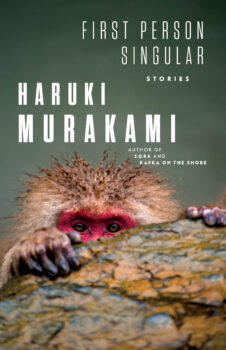Of all the forces that make us human, memory is perhaps one of the most powerful. It can trouble our dreams, but it can also be a source of immense happiness. It’s the dark forest we run from, and the sunlit garden to which we would return, if only that were possible. In the eight stories that make up his latest collection, First Person Singular (Knopf), Haruki Murakami sets out to explore memory’s strange and haunted landscape.
True to its title, the stories here are all told in the first person, and are presented to us in the tonally flat yet somehow peculiarly expansively affect with which readers of Murakami’s past work will be well familiar. Oddness abounds. Characters find themselves lost in seemingly abandoned mountain towns. They forget the names of past lovers, or even their own names, the way you might lose your keys. The dead return in dreams, and in dreams characters are treated to jazz performances by Charlie Parker. There’s even a talking, humanlike monkey who steals the names of the women with whom he falls in love, and in doing so, obliterates a little piece of their memory.
So yes—quite odd.
 But that oddness aside, it’s those moments when the characters in Murakami’s collection connect—either in scene or through the shifting kaleidoscope of memory—which make the best stories in First Person Singular shine. In the quiet yet powerfully moving story “On a Stone Pillow,” the narrator recalls a young woman he once spent the night with many years ago when he was nineteen. A waitress in the restaurant where he works, she is older, in her mid-twenties, and is in love with a man whom, she tells the narrator, does not really love her. She’s also a writer of poetry, and weeks after their night together, the narrator receives a package in the mail from her, a hand-printed book of poems, on the first page of which is stamped the number 28. “Must have been the twenty-eighth in a limited edition,” Murakami writes. “How many were there altogether? There was no price indicated anywhere. Maybe there never was a price.” All these years later, he has held onto the collection. “I have no idea, of course, whether she’s still writing [poems] or not. As I said, I don’t even know her name, and hardly remember her face at all.” He suspects she may not even be alive anymore. But her voice—the voice that rings through her poetry—has stayed with him.
But that oddness aside, it’s those moments when the characters in Murakami’s collection connect—either in scene or through the shifting kaleidoscope of memory—which make the best stories in First Person Singular shine. In the quiet yet powerfully moving story “On a Stone Pillow,” the narrator recalls a young woman he once spent the night with many years ago when he was nineteen. A waitress in the restaurant where he works, she is older, in her mid-twenties, and is in love with a man whom, she tells the narrator, does not really love her. She’s also a writer of poetry, and weeks after their night together, the narrator receives a package in the mail from her, a hand-printed book of poems, on the first page of which is stamped the number 28. “Must have been the twenty-eighth in a limited edition,” Murakami writes. “How many were there altogether? There was no price indicated anywhere. Maybe there never was a price.” All these years later, he has held onto the collection. “I have no idea, of course, whether she’s still writing [poems] or not. As I said, I don’t even know her name, and hardly remember her face at all.” He suspects she may not even be alive anymore. But her voice—the voice that rings through her poetry—has stayed with him.
In another one of the collection’s strongest stories, “With the Beatles,” the narrator is haunted not only by the memory of a girl named Sayoko whom he dated in high school back in 1964, but by the music of his youth. He recalls a Sunday when he went to pick up Sayoko for a date, only to encounter her older brother, who invites him inside the house. The brother is something of an oddball, and in a subtly menacing scene he tells the narrator that he suffers from a genetic disorder which causes him to occasionally blackout and lose large chunks of memory. He admits to worrying that he might, in the midst of a blackout, bash someone’s head in with a hammer. With Murakami’s typically deadpan style, the narrator tells us: “I had no idea what to say. I understood now why my girlfriend never wanted to talk about her brother.” Twenty years later he and the brother meet again, and the narrator discovers what eventually happened to Sayoko.
As good as these stories are, there’s a few that fall flat. In “The Yakult Swallows Poetry Collection,” a character who may or may not be Murakami recounts his obsession with attending baseball games, and shares with us some of the poems he will occasionally write when the games’ action slows. Similarly, in “Charlie Parker Plays Bossa Nova,” the narrator—who like Murakami is a jazz enthusiast—imagines up an album the late jazz legend never made. I suppose fans of Murakami might find these autofictional elements interesting, offering a glimpse of the liminal space between author and narrator, narrator and character. But where Murakami truly shines in this collection is where he always has as a writer: when what’s on the page departs reality, when it embraces the odd and the strange. And when, in the midst of that dreamlike strangeness, we find human connection.






